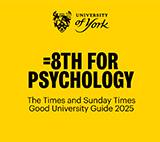
Cognitive Listening: Bridging the gap between speech science and cognitive psychology

Tuesday 7 November 2023, 4.00PM to 5.00pm
Speaker(s): Professor Sven Mattys, University of York
Abstract
Improving the validity of speech-recognition models requires an understanding of how speech is processed in everyday life. "Cognitive Listening" explores how memory and attention functions underpin speech recognition in challenging conditions (e.g., noise, distraction). In this presentation, I will discuss: (1) the processes engaged in selectively attending to a target speaker while inhibiting competing talkers or background noise, (2) the challenges of dividing attention between a target speaker and another stimulus, (3) the importance of considering listening effort when attempting to characterise listening performance. Drawing upon behavioural and psychophysical methods, I will describe conditions in which ignoring an auditory distractor (e.g., a competing talker) can be easy as opposed to hard and the extent to which high working memory capacity can facilitate selective attention. Contrary to expectations, the contribution of cognitive control and working memory to listening performance will be shown to be relevant only when the degree of energetic masking between two auditory signals is low, which will be discussed in light of Norman and Bobrow’s (1975) seminal contrast between data-limited and resource-limited tasks. Finally, using the task-evoked pupil response, I will show that achieving a certain level of listening performance can require different degrees of mental effort depending on motivation and individual differences in cognitive abilities. Together, the results will provide a dynamic picture of the interface between sensory processing, working memory, and attention control during speech recognition.
Location: PS/B/020
